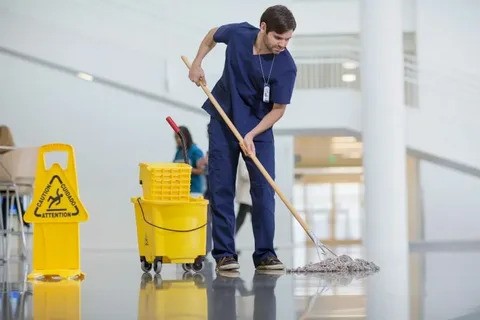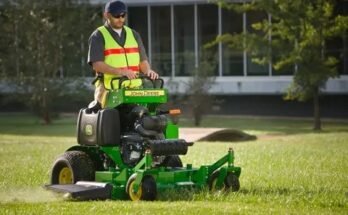USA Cleaner Jobs
The cleaning industry in the USA plays an essential role in maintaining public health and hygiene across various sectors, from homes and offices to healthcare facilities and industrial spaces. With growing demand for professional cleaning services, cleaner jobs offer a wide range of employment opportunities for both entry-level workers and those with specialized skills. This blog article delves into the different types of cleaner jobs available in the USA, the qualifications needed, industry challenges, and future trends.
Overview of Cleaner Jobs in the USA
In the USA, cleaner jobs can be found in virtually every sector. Cleaners are responsible for maintaining cleanliness and sanitation in both public and private spaces. Their work ensures that businesses, homes, hospitals, schools, and other environments remain safe and aesthetically pleasing. With increasing awareness of hygiene, particularly in the wake of the COVID-19 pandemic, the demand for professional cleaners has surged.
There are several types of cleaner jobs, each serving different settings and requiring different skill sets. Whether working independently or as part of a cleaning service company, cleaners are often the backbone of facility management.
Types of Cleaner Jobs
1. Residential Cleaners
- Overview: Residential cleaners work in private homes, providing general cleaning services such as dusting, vacuuming, mopping, and sanitizing kitchens and bathrooms. Many residential cleaners are self-employed or work for cleaning agencies that offer regular services to homeowners.
- Duties: Cleaning living spaces, washing dishes, laundry, deep cleaning kitchens and bathrooms, and organizing.
- Skills required: Attention to detail, good time management, ability to handle cleaning chemicals safely, and customer service skills.
- Common clients: Homeowners, renters, and landlords preparing properties for new tenants.
- Growth opportunities: Many residential cleaners transition to running their own cleaning businesses as they gain experience and build a client base.
2. Commercial Cleaners
- Overview: Commercial cleaners focus on cleaning offices, retail spaces, warehouses, and other commercial properties. They may be employed by a cleaning company or directly by the business that requires their services. Cleaning is often done after business hours to avoid disruption.
- Duties: Vacuuming, mopping, emptying trash bins, cleaning restrooms, and maintaining communal areas like break rooms.
- Skills required: Knowledge of commercial cleaning equipment and chemicals, ability to work independently, and time management.
- Typical workplaces: Offices, shopping centers, warehouses, and restaurants.
- Growth opportunities: Supervisory roles, team leader positions, or management of a cleaning crew.
3. Janitors and Custodians
- Overview: Janitors and custodians provide cleaning and maintenance services, often for large institutions such as schools, hospitals, and government buildings. These workers are typically responsible for a broader range of tasks beyond basic cleaning, including minor repairs and upkeep.
- Duties: Sweeping, mopping, window cleaning, restroom maintenance, taking out the trash, performing minor repairs, and restocking supplies.
- Skills required: General knowledge of maintenance, ability to lift heavy objects, familiarity with industrial cleaning equipment, and strong problem-solving skills.
- Workplaces: Schools, universities, hospitals, government buildings, and large office complexes.
- Growth opportunities: Many janitors move into building maintenance or facility management roles.
4. Industrial Cleaners
- Overview: Industrial cleaners work in factories, warehouses, and manufacturing plants, cleaning machinery, floors, and industrial workspaces. They often deal with hazardous materials and must follow strict safety protocols.
- Duties: Cleaning industrial machinery, removing debris, handling chemicals, pressure washing, and maintaining cleanliness in production areas.
- Skills required: Knowledge of industrial cleaning techniques, ability to use heavy-duty cleaning equipment, and understanding of safety standards.
- Workplaces: Factories, oil refineries, chemical plants, and industrial warehouses.
- Growth opportunities: Specialized roles in hazardous material cleaning, safety compliance, or industrial maintenance.
5. Healthcare Cleaners
- Overview: Healthcare cleaners are responsible for maintaining a sterile and hygienic environment in hospitals, clinics, nursing homes, and other healthcare facilities. Given the high-risk nature of healthcare settings, these cleaners must follow strict protocols to prevent the spread of infections.
- Duties: Disinfecting patient rooms, surgical areas, restrooms, and waiting areas; disposing of medical waste; and ensuring that cleaning complies with healthcare regulations.
- Skills required: Understanding of healthcare sanitation procedures, attention to detail, ability to follow strict hygiene protocols, and knowledge of handling biohazardous waste.
- Workplaces: Hospitals, dental clinics, long-term care facilities, and medical offices.
- Growth opportunities: Advancement into specialized healthcare cleaning roles or infection control management.
6. Window Cleaners
- Overview: Window cleaners specialize in cleaning glass surfaces, including windows, mirrors, and glass partitions in both residential and commercial buildings. This can involve working at heights, especially in high-rise buildings.
- Duties: Cleaning and polishing glass surfaces, using ladders or lifts to access high windows, and ensuring streak-free finishes.
- Skills required: Knowledge of window cleaning techniques, ability to work at heights, and proper use of safety equipment.
- Workplaces: Office buildings, retail stores, homes, and skyscrapers.
- Growth opportunities: Larger contracts with commercial properties, supervisory roles, or owning a window cleaning business.
7. Specialized Cleaners
- Overview: Specialized cleaners handle unique or challenging cleaning tasks, such as cleaning crime scenes, fire or flood restoration, and biohazard cleanup. These roles often require specific certifications and training.
- Duties: Cleaning up hazardous materials, restoring spaces after fires or floods, crime scene cleanup, and handling waste safely.
- Skills required: Specialized training, ability to work in high-stress environments, and knowledge of safety protocols for hazardous materials.
- Workplaces: Crime scenes, disaster sites, hospitals, and industrial facilities.
- Growth opportunities: Training in advanced cleaning techniques, leading a specialized cleaning crew, or opening a restoration business.
Qualifications and Training for Cleaner Jobs
Most cleaner jobs in the USA do not require formal education beyond a high school diploma, making them accessible to a wide range of job seekers. However, specific roles, such as healthcare or industrial cleaners, may require certifications or specialized training to ensure compliance with industry regulations.
For example:
- Healthcare cleaners may need training in infection control and biohazard management.
- Industrial cleaners might need certifications to handle hazardous materials or operate heavy-duty cleaning equipment.
- Window cleaners who work at heights may require safety training and certification in operating lifts or working with harnesses.
Many cleaning companies offer on-the-job training for new employees, helping them develop the necessary skills to work efficiently and safely. Additionally, soft skills such as attention to detail, time management, and customer service are crucial in most cleaning jobs, particularly those that involve interacting with clients directly.
Challenges Faced by Cleaners
While cleaner jobs provide steady employment for many, the profession comes with its own set of challenges:
- Physical Demands: Cleaning is physically demanding work, often requiring long hours of standing, bending, lifting, and repetitive motion. Cleaners may also need to use ladders or heavy equipment, adding to the physical strain.
- Exposure to Hazardous Materials: Cleaners, especially those in healthcare and industrial settings, may be exposed to hazardous chemicals, biohazards, or sharp objects. Proper training and protective gear are essential, but the risk of injury or illness remains.
- Low Wages and Benefits: Many cleaning jobs are low-paying, with limited opportunities for benefits such as healthcare or retirement plans. According to the U.S. Bureau of Labor Statistics, the median annual wage for janitors and building cleaners was $31,860 in May 2023, which can vary by location and job type.
- Irregular Hours: Cleaners, particularly those in commercial and industrial settings, often work outside normal business hours, including nights, weekends, and holidays. This can make work-life balance a challenge, especially for those with families or other responsibilities.
- Job Security: While demand for cleaners is steady, the rise of automation and self-cleaning technologies in industries such as hospitality and retail may reduce the number of cleaning jobs in the future.
Trends in the Cleaning Industry
As the cleaning industry evolves, several key trends are shaping the future of cleaner jobs in the USA:
- Increased Demand for Green Cleaning: Many businesses and homeowners are looking for eco-friendly cleaning services that use non-toxic, biodegradable products. Cleaners with knowledge of green cleaning techniques and products are likely to find more opportunities as this trend continues to grow.
- Technology and Automation: Robotic vacuums, self-cleaning devices, and other automated solutions are beginning to take over some cleaning tasks, particularly in commercial settings. However, human cleaners will still be needed for more detailed and specialized work, especially in healthcare and industrial environments.
- Post-Pandemic Hygiene Standards: The COVID-19 pandemic highlighted the importance of maintaining high hygiene standards, particularly in public spaces. As a result, demand for professional cleaners, particularly those trained in disinfection and sanitation, has remained strong. Businesses are also investing more in regular deep cleaning services.
- Flexible and Gig Economy Jobs: Many cleaners are opting for more flexible, gig-based work opportunities through platforms such as Handy or TaskRabbit. These platforms allow cleaners to set their own schedules and work on a per-job basis, offering greater autonomy compared to traditional employment.
USA Cleaner Jobs
Cleaner jobs in the USA provide essential services across a wide range of industries. From residential and commercial cleaning to healthcare and industrial sanitation, cleaners play a vital role in maintaining public health and safety. While these jobs come with physical challenges and varying pay scales, they offer steady employment and opportunities for growth, particularly as demand for specialized cleaning services increases.
As the industry evolves with new technologies, environmental concerns, and post-pandemic health standards, cleaner jobs are expected to continue growing, offering diverse opportunities for those willing to meet the demands of the role. Whether working independently or as part of a cleaning company, cleaners will remain a critical component of the American workforce.



